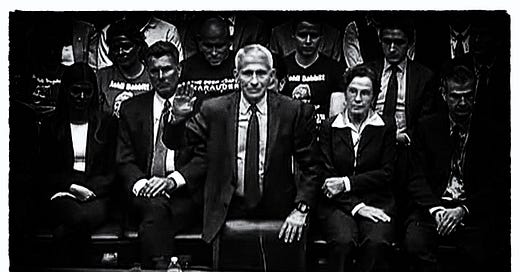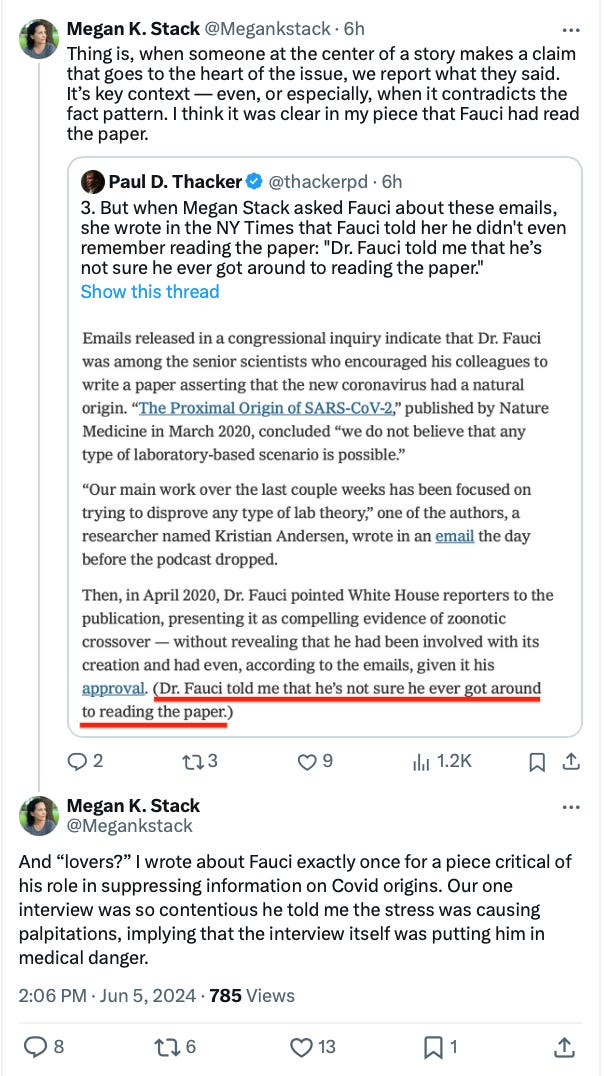In Sworn Congressional Testimony, Tony Fauci Admits He Fibbed to the New York Times, But What’s a Lie Among Lovers?
Some journalists found their Brokeback Mountain with Tony.
5 minute read
UPDATE: On X, New York Times reporter Megan Stack confirmed that Fauci lied to her. Stack is the only reporter at the Times to aggressively question Fauci about his involvement in promoting the Nature Medicine “Proximal Origins’ paper, and she tweeted that “Our one interview was so contentious he told me the stress was causing palpitations, implying that the interview itself was putting him in medical danger.”
There it is, buried among two days of sworn congressional testimony—523 pages of testimony, in fact, with “I can’t recall” over 100 times when the inquiry got too close to tying him to a possible lab accident in Wuhan—Anthony Fauci admitting he misled the New York Times, just like he misled Congress during a Senate hearing when he said he didn’t fund dangerous gain-of-function studies in Wuhan.
From the pandemic’s beginning, the Times dutifully promoted Fauci as the guy who “sticks to the facts” and lauded him as “the nation’s top infectious disease expert” before handing him their opinion page to lecture the next generation of scientists when he retired in 2022.
So when I caught Fauci admitting, accidently, to congressional investigators that he lied to the New York Times, I knew it wouldn’t matter to the Times. Because what’s a lie among lovers?
Back in March 2023, Times reporter Megan K. Stack discussed Fauci’s involvement in one of the critical papers that advanced the theory that the pandemic could not have started in a lab—a lab that Fauci himself was funding in Wuhan. We only learned about Fauci’s involvement in this paper because Congress fought the NIH to get the emails.
Stack’s article was one of the few critical pieces the Times has published on Fauci, but when she asked him to explain the emails showing his involvement in a paper that exonerated him from funding a lab accident in Wuhan, he denied reading it: “Dr. Fauci told me that he’s not sure he ever got around to reading the paper.”
Here’s the entire passage of what Stack reported:
Emails released in a congressional inquiry indicate that Dr. Fauci was among the senior scientists who encouraged his colleagues to write a paper asserting that the new coronavirus had a natural origin. “The Proximal Origin of SARS-CoV-2,” published by Nature Medicine in March 2020, concluded “we do not believe that any type of laboratory-based scenario is possible.”
“Our main work over the last couple weeks has been focused on trying to disprove any type of lab theory,” one of the authors, a researcher named Kristian Andersen, wrote in an email the day before the podcast dropped.
Then, in April 2020, Dr. Fauci pointed White House reporters to the publication, presenting it as compelling evidence of zoonotic crossover — without revealing that he had been involved with its creation and had even, according to the emails, given it his approval. (Dr. Fauci told me that he’s not sure he ever got around to reading the paper.)
I suspected that Fauci was lying to Stack that he was “not sure he ever got around to reading the paper” because I had read Fauci’s emails, had spoken to his colleagues, and knew he had a history of lies, deceit, and evasion. I wrote as much a few days later: “Even when his own emails are put in front of him, Fauci dissembles on the pandemic.”
And Fauci’s sworn congressional testimony proved me right. Fauci did read the paper. Not only that, Fauci confessed that he “took a look” at several drafts of the “Proximal Origins” paper, but claimed they were very complicated. “[N]ot being an evolutionary virologist, I didn’t quite understand the sequences.”
Here’s the passage from Fauci’s January testimony where he answers that he had read the paper, starting on day 2, page 71 of his sworn deposition:
Q As the minority said, we've talked to all the U.S.-based authors or those who are acknowledged on that paper, so I won't go through all of the science in it, except for I want -- you were sent drafts periodically?
A Right.
Q A couple. I think it was less than 10, more than 5, drafts --
A Right.
Q -- periodically. Do you recall ever reviewing the drafts as they were coming in?
A It depends on what you mean by "review." I took a look at them. I didn't make any editing or modification of it. As they came in, I remember once saying -- after maybe the final one came in, and said, you know, "Well done, nice job," sort of a courtesy response. But, again, not being an evolutionary virologist, I didn't quite understand the sequences.
Q Yeah, yeah. No, I understand. They're difficult to follow, that's for sure.
A Yes.
Q It's kind of drinking from a fire hose. So I want to understand that correctly. The drafts would come in. You maybe, maybe not, would open them, read them –
A Yes.
Q -- and then say, "Thanks," something like that, in response?
A Yeah. It was mostly "Thanks," you know, "Appreciate it."
Now that we know Fauci lied to the Times about reading the paper, the obvious question arises: what else did he lie to the Times and other reporters about? More importantly, will reporters at the Times and other outlets feel they need take a more skeptical look at Tony Fauci’s assertions, often undermined by emails and documents, that serve to redirect the public’s attention away from his funding for dangerous virus research in Wuhan that may have caused this pandemic?
Not likely. For too many reporters, the only feeling they have for Tony Fauci is “I wish I knew how to quit you.”
Hey readers, just wanted to note this brief exchange that Ryan Grim with The Intercept is circulating on X. Before the COVID Select’s hearing with Tony Fauci’s Senior Advisor David Morens, congressional investigators released a memo with communications by Morens where he detailed using Gmail to hide from FOIA and made multiple incriminating remarks about Tony Fauci also trying to hide his communications from journalists and government investigators.
Here’s one example of such an email sent by Morens.
Ryan Grim began circulating an exchange between Congresswoman Debbie Dingell warning Morens to not disclose too much, something that I also noticed and found very shocking.
“This is kind of shocking to watch,” Grim posted on X. “A Democratic congresswoman demanding a witness not reveal too much.”
It’s quite clear that Democrats are more interested in protecting Fauci than getting to the bottom of how this pandemic began and how we can stop the next one.







I watched the hearing and not only did he not seem to know what his group was doing but had no problem throwing everyone around him under the bus.
The corruption runs deep. For the life of me I cannot figure out why anybody would resist the truth about a pandemic that killed millions of people. It’s next to impossible to hold people accountable with all the inner protection going on.